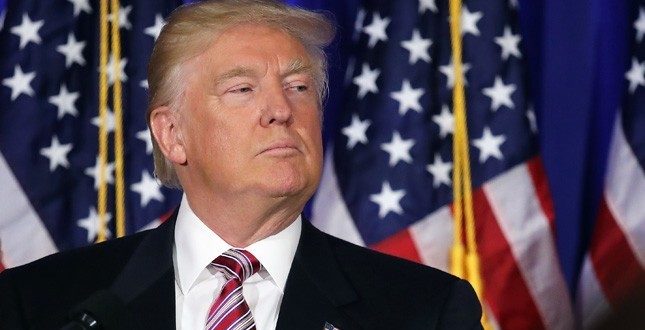US President Donald Trump has dismissed concerns over climate change on a visit to fire-ravaged California, telling an official “I don’t think science knows” about global warming.
“It’ll start getting cooler, you just watch,” Mr Trump said after he was urged not to “ignore the science”.
Blazes in several states have burned vast areas of land and killed at least 36 people since early August.
Scientists say human activities have driven up global temperatures.
But Mr Trump has blamed poor forest management for the fires that have burned almost 2 million hectares (5 million acres) of land in California, Oregon and Washington state.
During his visit to the US West Coast, Mr Trump – who has often denied climate change – repeated his argument on forest management as he met Californian officials involved in the battle against the wildfires.
Earlier on Monday, Democratic presidential candidate Joe Biden called Mr Trump “a climate arsonist”.
In 2018, the president criticised California’s forest management, pointing to Finland, where he said they raked and cleared the forests to prevent fires.
What else did Trump say about climate?
When asked by a reporter whether climate change was a factor in the massive wildfires, Mr Trump responded: “I think this is more of a management situation.”
He also claimed that other countries had not dealt with the same level of forest fires, despite major conflagrations in Australia and the Amazon rainforest in recent years that experts attributed to the changing climate.
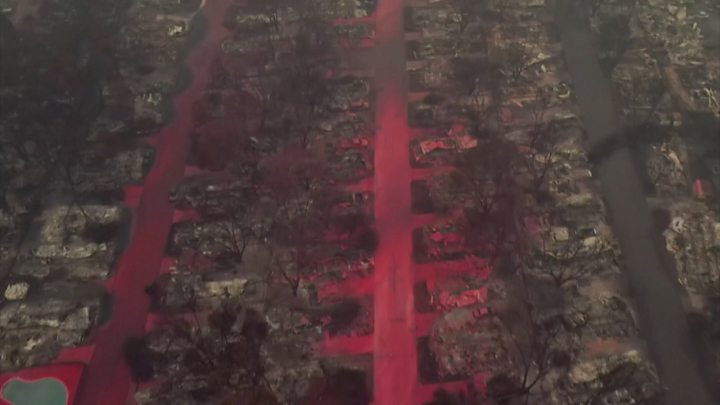
“They don’t have problems like this,” he said. “They have very explosive trees, but they don’t have problems like this.”
He added: “When you get into climate change, well is India going to change its ways? And is China going to change its ways? And Russia? Is Russia going to change its ways?”
Mr Trump has previously called climate change “mythical”, “non-existent”, or “an expensive hoax”
He pulled the US out of the Paris climate agreement, which committed the US and 187 other countries to keeping a global temperature rise this century well below 2C (3.6F) above pre-industrial levels.

Irony in Trump’s move to abandon Paris

It’s a path well worn by President Trump, especially in relation to climate change – other countries are taking advantage of the US and not doing their fair share.
But the irony is that the absence of the US from the Paris agreement is making a changing of the ways much harder to achieve.
In the Paris pact, China committed to peak its carbon emissions by 2030 at the latest – and is on course to do that.
India agreed to reduce the intensity of its emissions by 2030, and significantly increase renewables as part of the energy mix. Last year, India’s spending on solar energy eclipsed coal fired power for the first time. Russia has pledged to cut carbon by up to 30% of 1990 levels by 2030.
So all these countries have undertaken and are set to meet their commitments.
Where the president might have a point though, is in the scale of these countries’ efforts, which have all been rated as “highly insufficient” if the world is to avoid dangerous warming.
However, the real strength of the Paris agreement was to get every country to commit to doing something, however paltry, and then use peer pressure to ratchet up those commitments over time.

What’s the latest on the ground?
Strong winds and low humidity have been hampering efforts to keep the fires under control.
Authorities in California, where 25 people have died since 15 August, report that firefighters are working to tackle “hot spots” to allow some residents to return to several neighbourhoods in areas near San Francisco.
State officials have also warned that while storms forecast for later in the week could bring much-needed rainfall, they could also bring more lightning.
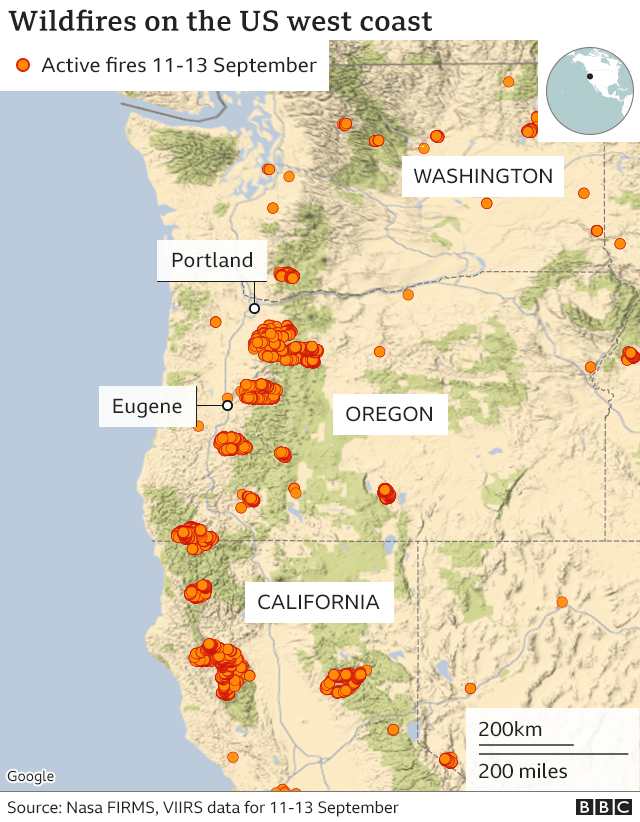

Thousands of homes and other properties have been destroyed in California, Oregon and Washington state, and large areas of land have been covered with ash.
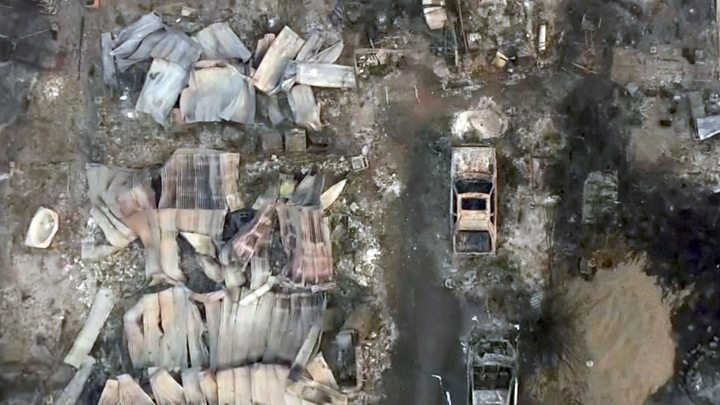
At least 10 people have been killed in Oregon in the past week. Officials have said dozens of people are missing and warned that the death toll could rise.
Police in Oregon have set up the state’s first ever mobile mortuary, the Oregonian newspaper reports. The report adds that a separate facility is being created to allow the families of those reported missing to undergo DNA testing to help with the identification process.
One person has died in Washington, where there were five large fires on Sunday.
What are the politicians saying?
Speaking at a meeting with Mr Trump on Monday, California Governor Gavin Newsom acknowledged that “we have not done justice on our forest management”, but he said that more than half of the land in California was under federal, not state control.
The state itself owns just three per cent, with the rest owned by private individuals or companies or Native American groups.
But he echoed his own statement from Friday that the fires showed the debate about climate change was “over”.
“The hots are getting hotter, the dries are getting drier,” he said. “We submit the science is in and observed evidence is self-evident: that climate change is real and that is exacerbating this.”
Oregon Governor Kate Brown has said her state is facing “the perfect firestorm” and called the moment “truly the bellwether for climate change on the West Coast”.
“And this is a wake-up call for all of us that we have got to do everything in our power to tackle climate change,” she said.
Washington Governor Jay Inslee described the situation as “apocalyptic” and condemned Mr Trump’s stance on the climate.
What role is climate change playing?
Nine of the world’s 10 warmest years on record have occurred since 2005, and the UN warned this week that the five years from 2016 until this year will very probably be the hottest such period yet recorded. Both Oregon and California have warmed by more than 1C since 1900.
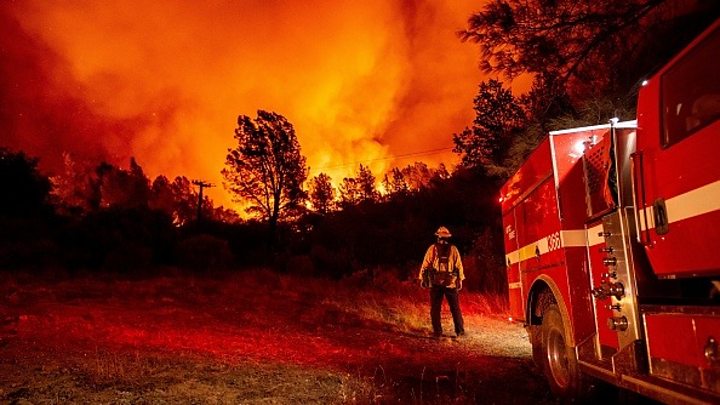
The sustained warmth has seen six of the 20 largest fires on record in California all occur this year. In Oregon, the spate of fires burned almost twice the amount of average annual losses in a week.
In California, a prolonged drought over the past decade has killed millions of trees, turning them into potent fuel for the fires. Mountain regions that are normally cooler and wetter have dried out more rapidly in the summer, adding to the potential fuel load.
Source: bbc.com
 Home Of Ghana News Ghana News, Entertainment And More
Home Of Ghana News Ghana News, Entertainment And More
